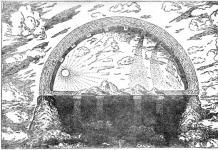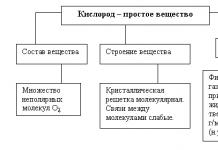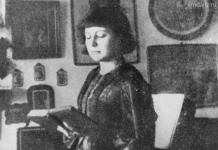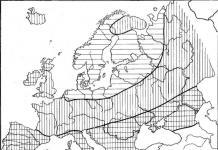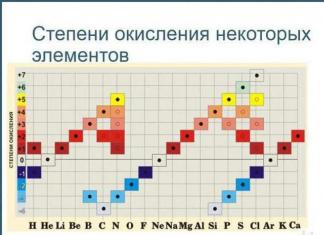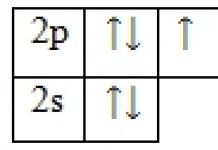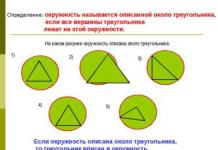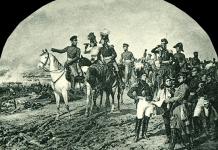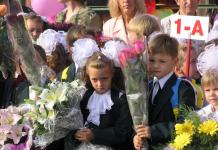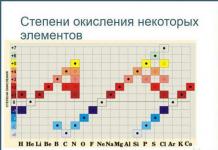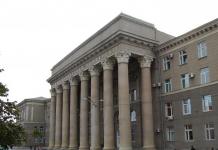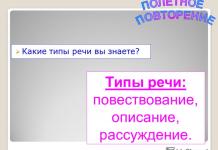Russian literary language
Each national language develops its own sample form existence. How is it characterized?
Literary language is characterized by:
1) developed writing;
2) generally accepted norm, that is, the rules for the use of all linguistic elements;
3) stylistic differentiation of linguistic expression, that is, the most typical and appropriate linguistic expression, determined by the situation and content of speech (publicistic speech, business, official or casual speech, work of art);
4) interaction and interconnection of two types of existence literary language– bookish and colloquial, both in written and oral forms (article and lecture, scientific discussion and dialogue between friends, etc.).
The most essential feature of a literary language is its general acceptance and that's why general intelligibility. The development of a literary language is determined by the development people's culture.
The earliest period of Old Russian literary language (XI-XIV centuries) determined by history Kievan Rus and its culture. What marked this time in the history of the ancient Russian literary language?
In the XI-XII centuries. fiction, journalistic and narrative-historical literature is being developed. The previous period (from the 8th century) created for this the necessary conditions, when the Slavic enlighteners - the brothers Cyril (about 827-869) and Methodius (about 815-885) compiled the first Slavic alphabet.
Old Russian literary language developed from the spoken language due to the existence of two powerful sources:
1) ancient Russian oral poetry, which transformed colloquial into processed poetic language (“The Tale of Igor’s Campaign”);
2) the Old Church Slavonic language, which came to Kievan Rus along with church literature (hence the second name - Church Slavonic).
The Old Church Slavonic language enriched the emerging literary Old Russian language. There was an interaction between two Slavic languages (Old Russian and Old Church Slavonic).
Since the 14th century, when the Great Russian nationality emerged and the history of the Russian language began, the literary language developed on the basis of the Moscow koine, continuing the traditions of the language that developed during the time of Kievan Rus. During the Moscow period, there was a clear convergence of the literary language with colloquial speech, which is most fully manifested in business texts. This rapprochement intensified in the 17th century. In the literary language of that time there is, on the one hand, a significant variegation(folk-colloquial, book-archaic and elements borrowed from other languages are used), and on the other hand, the desire to streamline this linguistic diversity, that is, to linguistic normalization.
One of the first normalizers of the Russian language should be called Antioch Dmitrievich Kantemir(1708-1744) and Vasily Kirillovich Trediakovsky(1703-1768). Prince Antioch Dmitrievich Kantemir is one of the most prominent educators of the early 18th century, he is the author of epigrams, fables, and poetic works (satire, poem “Petrida”). Cantemir is the author of numerous translations of books on various issues of history, literature, and philosophy.
Artistic and creative activity HELL. Kantemira contributed to the streamlining of word usage, enriching the literary language with words and expressions of folk colloquial speech. Kantemir spoke about the need to free the Russian language from unnecessary words of foreign origin and from archaic elements of Slavic writing.
Vasily Kirillovich Trediakovsky (1703-1768) is the author of a large number of works on philology, literature, and history. He tried to solve the cardinal problem of his time: rationing literary language (speech “On the purity Russian language", delivered on March 14, 1735). Trediakovsky renounces church-bookish expressions; he strives to lay the foundations of a literary language based on folk speech.
M.V. did a lot to streamline the Russian language. Lomonosov. He was “the first founder of Russian poetry and the first poet of Rus'... His language is pure and noble, his style is precise and strong, his verse is full of brilliance and soaring” (V.G. Belinsky). Lomonosov's works overcome archaism speech means literary tradition, the foundations of standardized literary speech. Lomonosov developed theory of three styles(high, middle and low), he limited the use of Old Church Slavonicisms, which were already incomprehensible at that time and complicated and burdened speech, especially the language of official, business literature.
In the 18th century, the Russian language was renewed and enriched at the expense of Western European languages: Polish, French, Dutch, Italian, and German. This was especially evident in the formation of the literary language and its terminology: philosophical, scientific-political, legal, technical. However, excessive enthusiasm for foreign words did not contribute to the clarity and accuracy of expression of thought.
M.V. Lomonosov played significant role in production Russian terminology. As a scientist, he was forced to create scientific and technical terminology. He owns words that have not lost their significance today:
atmosphere, combustion, degree, matter, electricity, thermometer and etc.
With its numerous scientific works it contributes to the formation scientific language.
In the development of the literary language of the 17th – early 19th centuries. The role of individual author’s styles increases and becomes decisive. The greatest influence on the development of the Russian literary language of this period was exerted by the works of Gabriel Romanovich Derzhavin, Alexander Nikolaevich Radishchev, Nikolai Ivanovich Novikov, Ivan Andreevich Krylov, Nikolai Mikhailovich Karamzin.
The works of these writers are characterized by an orientation towards living speech use. The use of folk colloquial elements was combined with a stylistically targeted use of book Slavic words and figures of speech. The syntax of the literary language has improved. A major role in the normalization of the Russian literary language at the end of the 18th – beginning of the 19th centuries. played an explanatory dictionary of the Russian language - “Dictionary of the Russian Academy” (parts 1-6, 1789-1794).
In the early 90s. XVIII centuries Karamzin’s stories and “Letters of a Russian Traveler” appear. These works constituted an entire era in the history of the development of the Russian literary language. Language was cultivated in them descriptions, which was called the “new syllable” as opposed to the “old syllable” of the archaists. The basis " new syllable" laid down the principle of bringing the literary language closer to the spoken language, the rejection of the abstract schematism of the literature of classicism, and interest in inner world person, his feelings. A new understanding of the role of the author was proposed, a new stylistic a phenomenon called individual author's style.
A follower of Karamzin, writer P.I. Makarov formulated the principle of bringing the literary language closer to the spoken language: the language should be uniform “for books and for society, to write as they speak and speak as they write” (Moscow Mercury magazine, 1803, No. 12).
But Karamzin and his supporters in this rapprochement were guided only by the “language of high society,” the salon of “lovely ladies,” that is, the principle of rapprochement was implemented distortedly.
But the question of how and on what grounds the literary language should come closer to the spoken language depended on the solution to the question of standards new Russian literary language.
Writers of the 19th century made a significant step forward in bringing the literary language closer to the spoken language, in substantiating the norms of the new literary language. This is creativity A.A. Bestuzheva, I.A. Krylova, A.S. Griboyedova. These writers showed what inexhaustible possibilities living folk speech has, how original, original, rich folklore language.
The system of three linguistic styles of the literary language from the last quarter of the 18th century. transformed into system of functional speech styles. The genre and style of a work of literature were no longer determined by the firm attachment of the lexeme, turn of phrase, grammatical norm and construction, as required by the doctrine of the three styles. The role has increased creative linguistic personality, the concept of “true linguistic taste” arose in the individual author’s style.
New approach to the structure of the text was formulated by A.S. Pushkin: true taste is revealed “not in the unconscious rejection of such and such a word, such and such a turn of phrase, but in a sense of proportionality and conformity” (Poln. sobr. soch., vol. 7, 1958). In Pushkin's work the formation of the national Russian literary language is completed. In the language of his works, the basic elements of Russian writing and oral speech came into balance for the first time. The era of a new Russian literary language begins with Pushkin. In his work, unified national norms were developed and consolidated, which linked both the book-written and spoken varieties of the Russian literary language into a single structural whole.
Pushkin finally destroyed the system of three styles, created a variety of styles, stylistic contexts, welded together by theme and content, and opened up the possibilities of their endless individual artistic variation.
In the language of Pushkin lies the source of the subsequent development of all language styles, which were further formed under his influence in the language of M.Yu. Lermontov, N.V. Gogol, N.A. Nekrasov, I.S. Turgenev, L.N. Tolstoy, F. M. Dostoevsky, A.P. Chekhov, I.A. Bunin, A.A. Blok, A.A. Akhmatova, etc. Since Pushkin, the system of functional speech styles was finally established in the Russian literary language, and then improved, existing since minor changes and now.
In the second half of the 19th century. There has been a significant development of journalistic style. This process is determined by the rise social movement. The role of the publicist is increasing as social personality, influencing the formation of public consciousness, and sometimes determining it.
Journalistic style begins to influence the development fiction. Many writers simultaneously work in the genres of fiction and journalism (M.E. Saltykov-Shchedrin, F.M. Dostoevsky, G.I. Uspensky, etc.). Scientific, philosophical, socio-political terminology appears in the literary language.
Along with this, the literary language is the second half of the 19th century V. actively absorbs a variety of vocabulary and phraseology from territorial dialects, urban vernacular and social and professional jargons.
Throughout the 19th century. the process of processing the national language is underway in order to create unified grammatical, lexical, spelling, spelling standards. These norms are theoretically substantiated in the works of Vostokov, Buslaev, Potebnya, Fortunatov, Shakhmatov.
The richness and diversity of the vocabulary of the Russian language is reflected in dictionaries. Well-known philologists of that time (I.I. Davydov, A.Kh. Vostokov, I.I. Sreznevsky, Y.K. Grot, etc.) published articles in which they defined the principles of the lexicographic description of words, the principles of collecting vocabulary, taking into account the goals and dictionary tasks. Thus, questions of the theory of lexicography are being developed for the first time.
The largest event was the publication in 1863-1866. four-volume " Explanatory dictionary living Great Russian language" IN AND. Dalia. The dictionary was highly appreciated by contemporaries. Dahl received the Lomonosov Prize of the Russian Imperial Academy of Sciences in 1863 and the title of honorary academician. (In the dictionary above 200 thousand words).
Dahl not only described, but indicated where this or that word occurs, how it is pronounced, what it means, in which proverbs and sayings it is found, what derivatives it has. Professor P.P. Chervinsky wrote about this dictionary: “There are books that are destined not just for a long life, they are not just monuments of science, they are eternal books. Eternal books because their content is timeless; neither social, nor political, nor even historical changes of any scale have power over them.”
The history of the Russian literary language is a section of Russian studies that studies the emergence, formation, historical transformations of the structure of the literary language, the correlative relationships of its constituent system components - styles, both linguistic and functional-speech and individual-author, etc., the development of written-bookish and oral -colloquial forms of literary language. The theoretical basis of the discipline is a comprehensive and versatile (historical-cultural, historical-literary, historical-poetic and historical-linguistic) approach to the study of the structure of literature. language, its norms at different stages historical development. The concept of the history of the Russian literary language as a scientific discipline was developed by V.V. Vinogradov and accepted by modern Russian linguistics. It replaced the previously existing approach in science, which was a commentary on Russian. lit. language of the 18th-19th centuries. with a collection of heterogeneous phonetic-morphological and word-formation facts against the background of understanding language as a tool of Russian. culture (works by E. F. Buddha).
In Russian philology of the 19th century there were four historical and linguistic concepts of the emergence and development of the ancient Russian literary language. 1. The Church Slavonic language and the Old Russian folk literary language are styles of the same “Slavic”, or old Russian literary language (A.S. Shishkov, P.A. Katenin, etc.). 2. The Church Slavonic (or Old Slavic) language (the language of church books) and the ancient Russian language of business and secular writing are different, although closely related languages, which were in close interaction and mixing until the end. 18 - beginning 19th centuries (A. Kh. Vostokov, partly K. F. Kalaidovich, M. T. Kachenovsky, etc.).
3. The Old Russian literary language is based on the Church Slavonic language (M. A. Maksimovich, K. S. Aksakov, partly N. I. Nadezhdin, etc.). According to Maksimovich, “the Church Slavonic language not only gave rise to the written Russian language..., but more than any other language it took part 163 in the further formation of our national language” (“History of Ancient Russian Literature,” 1839). 4. The basis of ancient Russian. lit. language - living East Slavic folk speech, close in its basic structural features to the Old Slavic language. Having adopted Christianity, Russian. the people “have already found all the books necessary for worship and for teaching in the faith, in a dialect that differed very little from their popular dialect”; “Not only in authentic works of Russian. scribes, but also in translations, the older they are, the more we see nationalities in the expression of thoughts and images” (I. I. Sreznevsky, “Thoughts on the history of the Russian language and other Slavic dialects”, 1887). The separation of book and folk languages caused by changes in colloquial, dialect speech Eastern Slavs, dates back to the 13th-14th centuries. This led to the fact that the development of the Old Russian literary language was determined by the relationship between two speech elements - the written common Slavic (Old Slavic, Old Slavic) and the oral and written national Old Russian. The following periods are distinguished in the development of the Russian literary language: literary language Ancient Rus'(from the 10th to the end of the 14th - early 15th centuries); literary language of Muscovite Rus' (from the late 14th - early 15th centuries to the 2nd half of the 17th century); literary language of the initial era of the formation of Russian. nations (from the mid-17th century to the 80-90s of the 18th century); the literary language of the era of the formation of the Russian nation and the formation of its national norms (from the end of the 18th century); Russian literary language of the modern era. The spread and development of writing and literature in Rus' begins after the adoption of Christianity (988), i.e. from the end 10th century The oldest written monuments are translations from Greek (Gospel, Apostle, Psalter...) Ancient Russian authors created during this period original works in the genres of preaching literature (“Words” and “Teachings” of Metropolitan Hilarion, Cyril of Turov, Luka Zhidyata, Clement Smolyatich), pilgrimage literature (“The Walk of Abbot Daniel”), etc. The Book Slavic type of language was based on the Old Slavic language. During this period of its history, Old Russian literature also cultivated narrative, historical and folk art genres, the emergence of which is associated with the development of the folk cultural or folk processed type of the Old Russian literary language. This is “The Tale of Bygone Years” (12th century) - an ancient Russian chronicle, the epic work “The Tale of Igor’s Host” (late 12th century), “The Teachings of Vladimir Monomakh” (12th century) - an example of “secular, hagiographic” genre, “The Prayer of Daniel the Sharper” (12th century), “The Word about the Destruction of the Russian Land” (late 13th - early 14th centuries). A special group of vocabulary of the Old Russian language consists of Old Slavic words, the same root as the corresponding Russian words, differing in sound appearance: breg (cf. shore), vlas (cf. hair), vrata (cf. gate), head (cf. head), tree (cf. tree), srachitsa (cf. shirt), store (cf. khoroniti), edin (cf. one), etc. In the Old Russian language, a number of purely lexical parallels are also distinguished, for example, marriage and wedding; neck and neck; rake and go; verbate, say and say, speak; Lanita and cheek; eyes and eyes; Percy and breasts; mouth and lips; forehead and forehead, etc. The presence of such lexical pairs enriched the literary language functionally, semantically and stylistically. The Old Russian literary language inherited from the Old Slavic language the means of artistic representation: epithets, comparisons, metaphors, antitheses, gradations, etc. By the middle of the 12th century. Kievan Rus declines, the period begins feudal fragmentation, which contributed to the dialectal fragmentation of the Old Russian language. From about the 14th century. On the East Slavic territory, closely related East Slavic languages developed: Russian, Ukrainian, Belarusian. The Russian language of the era of the Muscovite state (14th-17th centuries) had a complex history. The main dialect zones took shape - the North Great Russian dialect (approximately north of the Pskov - Tver - Moscow line, south of Nizhny Novgorod) and the South Great Russian dialect (up to the borders with the Ukrainian zone in the south and the Belarusian zone in the west). From the end of the 14th century. in Moscow, the editing of glories and church books is carried out to bring them to their original form, corresponding to the Greek originals. This editing was carried out under the leadership of Metropolitan Cyprian and was supposed to bring Russian writing closer to the South Slavic one. In the 15th century Rus. Orthodox Church leaves the tutelage of the Ecumenical Patriarch of Constantinople, the patriarchate is established in it 1589). The rise of Muscovite Rus' begins, the authority of the grand ducal power and the sinks, the church grows, the idea of Moscow's succession in relation to Byzantium becomes widespread, which finds its expression in the ideological formula “Moscow is the third Rome, and there will not be a fourth,” which receives theological, state-legal and historical and cultural understanding. In the book-Slavic type of literary language, archaic spellings based on the South Slavic spelling norm become widespread, and a special rhetorical manner of expression arises, flowery, lush, full of metaphors, called “twisting words” (“weaving words”).
From the 17th century The language of Russian science and the national literary language are being formed. The tendency towards internal unity and the convergence of literature is intensifying. language with colloquial. In the 2nd half. 16th century In the Moscow state, book printing began, which was of great importance for the fate of the Russians. lit. language, literature, culture and education. Handwritten culture was replaced by a written culture. In 1708, a civil alphabet was introduced, in which secular literature was printed. The Church Slavonic alphabet (Cyrillic) is used only for confessional purposes. In the literary language of the late 17th-1st half. 18th centuries Book-Slavic, often even archaic, lexical and grammatical elements, words and figures of speech of a colloquial and “mandatory” (“business”) nature and Western European borrowings are closely intertwined and interact.
The literary Russian language began to take shape many centuries ago. There are still debates in science about its basis, about the role of the Church Slavonic language in its origin. The Russian language belongs to the Indo-European family. Its origins go back to the existence and collapse of the common European (proto-Slavic) language. From this pan-Slavic unity (VI–VII centuries) several groups are distinguished: eastern, western and southern. It was in the East Slavic group that the Russian language would later emerge (XV century).
The Kiev state used a mixed language, which was called Church Slavonic. All liturgical literature, being copied from Old Church Slavonic Byzantine and Bulgarian sources, reflected the norms of the Old Church Slavonic language. However, words and elements penetrated into this literature Old Russian language. In parallel to this style of language, there was also secular and business literature. If examples of the Church Slavonic language are the “Psalter”, “Gospel” and so on, then examples of the secular and business language of Ancient Rus' are “The Tale of Igor’s Campaign”, “The Tale of Bygone Years”, “Russian Truth”.
This literature (secular and business) reflects the linguistic norms of the living spoken language of the Slavs, their oral folk art. Based on the fact that Ancient Rus' had such a complex dual language system, it is difficult for scientists to explain the origin of the modern literary Russian language. Their opinions differ, but the most common is the theory of the academician V. V. Vinogradova . According to this theory, two types of literary language functioned in Ancient Rus':
1) book Slavic literary language, based on Old Church Slavonic and used primarily in church literature;
2) a folk literary language based on the living ancient Russian language and used in secular literature.
According to V.V. Vinogradov, these are two types of language, and not two special languages, i.e. there was no bilingualism in Kievan Rus. These two types of language long time interacted with each other. Gradually they became closer, and on their basis in the 18th century. a single literary Russian language was formed.
The beginning of the stage of development of the Russian literary language is considered to be the time of the work of the great Russian poet Alexander Sergeevich Pushkin, who is sometimes called the creator of the modern Russian literary language.
A. S. Pushkin arranged artistic media Russian literary language, significantly enriched it. He managed, based on various manifestations of the folk language, to create in his works a language that was perceived by society as literary.
Pushkin’s work is truly a definite milestone in the history of the literary Russian language. We still read his works with ease and pleasure, while the works of his predecessors and even many of his contemporaries do so with some difficulty. one feels that they were writing in a now outdated language. Of course, a lot of time has passed since the time of A.S. Pushkin and a lot has changed, including the Russian language: some of it has left, a lot of new words have appeared. Although great poet did not leave us grammarians, he was the author of not only artistic, but also historical and journalistic works, he clearly distinguished between the author’s speech and characters, i.e., he practically laid the foundations for the modern functional-style classification of the literary Russian language.
The further development of the literary language continued in the works of great Russian writers, publicists, and in the diverse activities of the Russian people. End of the 19th century to the present - the second period of development of the modern literary Russian language. This period is characterized by well-established language norms, but these norms are being improved over time.
The state of the Russian literary language currently represents an acute problem for the state and for the entire society. This is explained by the fact that the entire historical experience of the people is concentrated and represented in the language: the state of the language testifies to the state of society, its culture, its mentality. Confusion and vacillation in society, the decline of morality, the loss of characteristic national features - all this affects the language and leads to its decline.
Preserving the language, caring for its further development and enrichment is a guarantee of the preservation and development of Russian culture. Therefore every citizen Russian Federation, no matter who he works, no matter what position he holds, he is responsible for the state of the language of his country, his people.
The 18th century is of greatest interest for understanding the formation and development of the literary language, when progressively minded circles of society tried to raise the authority of the Russian language and prove its worth as a language of science and art.
M.V. played a special role in the formation of the literary language during this period. Lomonosov. Possessing talent, enormous knowledge, and a passionate desire to change the attitude towards the Russian language not only of foreigners, but also of Russians, he creates the first “Russian Grammar” in the Russian language, in which he first presents the scientific system of the Russian language, compiles a set of grammatical rules, shows how to take advantage of its rich possibilities.
During this period, a concentration of national linguistic elements is planned due to the selection of the most common features of the South Russian and North Russian dialects. At the same time, the democratization of the language begins: in its lexical composition, grammatical structure a significant amount includes elements of the living oral speech of urban merchants, service people, the lower clergy, and literate peasants.
Along with democratization, the language begins to gradually free itself from the influence of the Church Slavonic language.
In the 17th century, the Russian language was renewed and enriched at the expense of Western European languages: Polish, French, Dutch, German, Italian. This was especially evident in the formation of the scientific language and its terminology: philosophical, economic, legal, scientific and technical.
At the end of the 18th - beginning of the 19th centuries, representatives of the democratically minded Russian intelligentsia, expressing their attitude to the reform of the literary language and its styles, emphasized that the issue of the literary language should not be resolved without determining the role of living folk speech in the structure of the national language. In this regard, the work of the great writers of the first half of the 19th century, Griboyedov and Krylov, is indicative, who proved what inexhaustible possibilities living folk speech has, how original, original, and rich the language of folklore is.
A.S. is rightfully considered the creator of the modern Russian literary language. Pushkin. His contemporaries wrote about the reformist nature of the poet’s work. So, N.V. Gogol rightly stated: “In it, as if in the lexicon, lies all the wealth, strength and flexibility of our language. He is more than anyone, he has further expanded his boundaries and shown his entire space more than anyone else.”
19th century - « silver Age"Russian literature and Russian language. At this time, there was an unprecedented flowering of Russian literature. The work of Gogol, Lermontov, Goncharov, Dostoevsky, L. Tolstoy, Saltykov-Shchedrin, Ostrovsky, Chekhov and others gains universal appreciation. Russian journalism reaches extraordinary heights: articles by Belinsky, Pisarev, Dobrolyubov, Chernyshevsky. The achievements of Russian scientists Dokuchaev, Mendeleev, Pirogov, Lobachevsky, Mozhaisky, Kovalevsky, Klyuchevsky and others are receiving worldwide recognition.
The development of literature, journalism, and science contributes to the further formation and enrichment of the Russian language. The vocabulary is replenished with new socio-political, philosophical, economic, technical terminology: worldview, integrity, self-determination, proletariat, humanity, education, reality and many others. etc. Phraseology is enriched: center of gravity, bring to one denominator, negative value, reach apogee, etc.
Scientific and journalistic literature increases the stock of international terminology: agitation, intelligentsia, intellectual, conservative, maximum, etc.
The rapid development of science and the steady growth of magazine and newspaper products contributed to the formation of functional styles of literary language - scientific and journalistic.
One of the most important features of a literary language as the highest form of a national language is its normativity. Throughout the 19th century, the process of processing the national language was underway in order to create uniform grammatical, lexical, spelling, and orthoepic norms. These norms are theoretically substantiated in the works of Vostokov, Buslaev, Fortunatov, Shakhmatov; are described and approved in the grammars of Vostokov, Grech, Kalaidovich, Grot, etc.
The richness and diversity of the vocabulary of the Russian language is reflected in dictionaries (historical, etymological, synonymous, foreign words) that appear in the 19th century.
Well-known philologists of that time published articles in which they defined the principles of lexicographic description of words, principles of vocabulary selection, taking into account the goals and objectives of the dictionary. Thus, issues of lexicography are being developed for the first time.
The largest event was the publication in 1863-1866. four-volume “Explanatory Dictionary of the Living Great Russian Language” by V.I. Dalia. The dictionary was highly appreciated by contemporaries. Its author in 1863 received the Lomonosov Prize of the Russian Imperial Academy of Sciences and the title of honorary academician.
So, by the beginning of the 20th century, the Russian literary language was formed, its norms were defined, its morphological and syntactic structures were described, dictionaries were compiled and published, which consolidated and legitimized its spelling, lexical, and morphological features.
When characterizing the literary language of the 20th century, two chronological periods should be distinguished: I - from October 1917 to April 1985 and II - from April 1985 to the present. What happens to the Russian literary language during these periods?
After education Soviet Union its development and enrichment continues. Most clearly increases lexicon literary language. The volume of scientific terminology, for example, related to cosmology and astronautics, is growing especially rapidly. Words are being created in large numbers to denote new phenomena and concepts that reflect fundamental changes in the state, political, and economic structure of the country, for example, Komsomol member, regional committee, virgin land worker, collective farm, socialist competition, kindergarten, etc. Fiction, journalistic, and popular science literature has expanded an arsenal of expressive and figurative means of the literary language. In morphology and syntax, the number of synonymous variants is increasing, differing in shades of meaning or stylistic coloring.
Researchers of the Russian language since the 20s. In the 20th century, special attention was paid to the theory of literary language. As a result, they identified and characterized the systemic and structural division of the literary language. Firstly, the literary language has two types: book-written and oral-spoken; secondly, each type is realized in speech. Book and writing is presented in a special speech (written - scientific speech and written official business speech) and in artistic and visual speech (written journalistic speech and written artistic speech). The oral-conversational type is presented in public speech (scientific speech and oral radio and television speech) and in colloquial speech (oral everyday speech).
In the 20th century, the formation of the Russian literary language ended, which began to represent a complex dark-structural organization.
The second period - the period of perestroika and post-perestroika - gave special significance to those processes that accompany the functioning of a language at all stages of its existence, made them more significant, more clearly expressed, brighter, more clearly presented. First of all, we should talk about a significant replenishment of the vocabulary of the Russian language with new words (state structure, barter, foreign currency, Internet, cartridge, case, kiwi, adidas, hamburger, etc.), about the actualization of a large number of words found; previously in the passive. In addition to new words, many words have been brought back to life that seemed to have gone out of use forever: gymnasium, lyceum, guild, governess, corporation, trust, department, communion, blessing, Maslenitsa, etc.
Speaking about replenishing the vocabulary of a literary language, it is impossible not to note: a striking feature of our current linguistic development is considered to be the clogging of speech with borrowings. The “foreignization” of the Russian language is of concern to linguists, literary critics, writers, and many others; The Russian language is dear to those who are concerned about its future fate.
Throughout its history, the Russian language has been enriched not only by internal resources, but also by other languages. But in some periods this influence, especially the borrowing of words, was excessive, and then the opinion appears that foreign words They don’t add anything new, since there are Russian words that are identical to them, and many Russian words cannot withstand competition with fashionable borrowings and are replaced by them.
The history of the Russian literary language shows: borrowing without measure clogs up speech, making it not understandable to everyone; reasonable borrowing enriches speech and gives it greater accuracy.
In connection with significant changes in the conditions for the functioning of language, another problem is becoming relevant at present, the problem of language as a means of communication, language in its implementation, the problem of speech.
What features characterize the functioning of the literary language at the end of the 20th century? beginning of XXI century?
Firstly, it has never been so numerous and diverse (in terms of age, education, official position, political, religious, public views, by party orientation) composition of participants in mass communication.
Secondly, official censorship has almost disappeared, so people express their thoughts more freely, their speech becomes more open, confidential, and relaxed.
Thirdly, spontaneous, spontaneous, unprepared speech begins to predominate.
Fourthly, the variety of communication situations leads to changes in the nature of communication. It frees itself from rigid formality and becomes more relaxed.
New conditions for the functioning of language, the emergence of a large number of unprepared public speeches lead not only to the democratization of speech, but also to a sharp decline in its culture.
How is it shown? Firstly, in violation of the orthoepic (pronunciation) and grammatical norms of the Russian language. Scientists, journalists, poets, and ordinary citizens write about this. There are especially many complaints about the speech of deputies, television and radio workers. Secondly, at the turn of the 20th and 21st centuries, the democratization of language reached such proportions that it would be more correct to call the process liberalization, or more precisely, vulgarization.
On the pages of periodicals, in speech educated people a stream of jargon, colloquial elements and other extra-literary means poured in: money, thing, piece, stolnik, bullshit, pump out, wash, unfasten, scroll and many others. etc. The words: party, showdown, chaos and much more have become commonly used even in official speech.
There are quite a few people who claim that swearing and swearing are considered characteristic, distinctive feature Russian people. If we turn to oral folk art, proverbs and sayings, it turns out that it is not entirely legitimate to say that the Russian people consider swearing an integral part of their life. Yes, people are trying to somehow justify it, to emphasize that swearing is a common thing: Swearing is not a reserve, and without it it won’t last for an hour; Swearing is not smoke - it won't hurt your eyes; Hard words break no bones. She even seems to help in the work; you can’t do without her: If you don’t curse, you won’t get the job done; Without swearing, you won’t be able to open the lock in the cage.
But something else is more important: It’s a sin to argue, but it’s a sin to scold; Do not scold: what comes out of a person is what defiles him; Swearing is not tar, but akin to soot: if it doesn’t stick, it gets dirty; People wither away from abuse, but get fat from praise; You can’t take it with your throat, you can’t beg it with abuse.
This is not only a warning, it is already a condemnation, it is a ban.
The Russian literary language is our wealth, our heritage. He embodied cultural and historical traditions people. We are responsible for his condition, for his fate.
The words of I.S. are fair and relevant (especially at the present time!). Turgenev: “In days of doubt, in days of painful thoughts about the fate of my homeland - you alone are my support and support, oh great, mighty, truthful and free Russian language! Without you, how can one not fall into despair at the sight of everything that is happening at home? But one cannot believe that such a language was not given to a great people!”
“The history of the Russian literary language as a scientific discipline grows out of the living experience of the cultural development of Russian society. First, this is a compilation of observations on changing norms literary spelling, literary phrases and word usage,” wrote V.V. Vinogradov 1. Of course, this course of research in the field of the history of the Russian literary language can be explained, first of all, by the essence of the literary language with its defining property of normalization. In the review “Russian Science of the Russian Literary Language,” Vinogradov, highlighting the history of the Russian literary language as an independent scientific discipline, reveals the relationship between various theories that proposed understanding the literary and linguistic process, trends and patterns of development of styles, with the evolution of the Russian literary language itself. He described in great detail the features of scientific observations of the Russian literary language in various cultural and historical periods.
V.V. Vinogradov noted the importance of dictionaries and grammars (for example, Lavrenty Zizaniy, Pamva Berynda) for understanding the role of the Church Slavonic language and reforming old grammatical constructions (the works of Melety Smotritsky) until the 18th century. He reflected the content scientific activity V.K. Trediakovsky, A.P. Sumarokov and especially M.V. Lomonosov, emphasizing the normative and stylistic orientation of his “Russian Grammar” (1755), which “predetermined the understanding and study of the grammatical system of the Russian literary language until the 20-30s.” 19th century." and influenced the nature of morphological research in later periods. The role of grammatical research by A. A. Barsov, the achievements of lexicographers of the second half of the 18th - first quarter of the 19th century, especially the compilers of the “Dictionary of the Russian Academy” (1789-1794), are recognized. An assessment is made of the concepts of the influence of the Old Church Slavonic language by A. S. Shishkov and A. Kh. Vostokov, and Vostokov’s research in the field of interaction between the Russian literary and Old Church Slavonic languages. The principles of studying the Russian literary language in relation to folk dialects and social group dialects of the founder of Russian scientific ethnography N.I. Nadezhdin are characterized. Vinogradov claims that “it was during this period that the scientific foundations of the history of the Old Russian literary language were laid.”
Period 40-70s of the XIX century. Vinogradov considers it a time of national-historical and philosophical quest, when among the main scientific trends were “the search for general historical patterns of the Russian literary and linguistic process; putting forward the problem of personality, the problem of individual creativity and its significance in the history of the literary language, the problem of the “writer’s language” (especially in relation to language reformers)” 1. In this regard, K. S. Aksakov’s dissertation “Lomonosov in the history of Russian literature and the Russian language” (1846) was noted.
The philological views and “Explanatory Dictionary of the Living Great Russian Language” (1863-1866) by V. I. Dahl are assessed as polemical in spirit and opposed to the works of Western philologists. It is known that this lexicographer decisively declared that “the time has come to appreciate the people’s language and develop an educated language from it.” Highly appreciating the means of the folk language as a source of updating literary speech, Dahl spoke of the need to free it from borrowings.
Among Westerners, Vinogradov singles out Y. K. Grot, whose achievements in the field of studying the history of the Russian literary language include the study of the language of writers (G. R. Derzhavin, N. M. Karamzin), the development of historical-stylistic and normative-grammatical directions. Grot is the author of the first attempt at a dictionary of the writer's language. “Grot’s literary-aesthetic principle is combined with the principles of cultural-historical parallelism between the development of the Russian language and the ideological development of the upper echelons of Russian society.”
It should be noted that in the middle of the 19th century. Russian linguists knew the concepts of Western European scientists, for example J. Grimm, who argued that “our language is also our history.” F. I. Buslaev emphasized the inseparability of the history of the people and the history of the language, which in his works received a cultural and historical interpretation involving the facts of folklore, regional dialects and ancient literary monuments. In the “Historical Reader” compiled by Buslaev, numerous examples of various styles were collected and commented on in notes.
The works of I. I. Sreznevsky, according to Vinogradov, belong to the “transitional period from the romantic-historical to the positive-historical” period, which was manifested in the evolution of Sreznevsky’s scientific views. Vinogradov considered some of the scientist’s views to be outdated, but emphasized that his most important work, “Thoughts on the History of the Russian Language,” determined the themes of the work of many generations of linguists. The merits of the linguist include the creation of a periodization of the history of the Russian language, the definition of its tasks, including “detailed lexical and grammatical descriptions of ancient monuments of the Russian language. Dictionaries should be compiled for them, explaining all the meanings and shades of words, indicating borrowings" 1 .
In his review of the stages of development of the history of the Russian literary language as a science and the contribution of outstanding scientists to its formation, Vinogradov writes about A. A. Potebnya as a linguist-thinker who “lays strong foundations for the history of the Russian language, among other things, the literary language, as the history of verbal creativity of the Russian people.<...>In his understanding, the history of the Russian literary language is closely intertwined with the history of Russian thought."
Many of Vinogradov’s works are devoted to the consideration of the concept of A. A. Shakhmatov: the work “The History of the Russian Literary Language as depicted by Academician A. A. Shakhmatov”, a section in the article “The Problem of the Literary Language and the Study of Its History in the Russian Linguistic Tradition of the Pre-Soviet Period”, etc. Shakhmatov created a concept of the evolution of the Russian literary language, supported by cultural-historical and literary research, and proposed a new understanding of the processes of its development. Vinogradov illuminated the content of Shakhmatov’s historical-linguistic concept and showed the transformation of the scientist’s views: from recognizing the Church Slavonic language as the basis of the written Russian language and pointing out the connection between the spread of Christian culture and the emergence of East Slavic writing - to the assertion that in Ancient Rus' the language of the educated classes was Russified Church Slavonic. Shakhmatov’s recognition of the enormous importance for the development of the Russian literary business language was valuable. written language and "Moscow dialect".
Considering Shakhmatov an encyclopedist scientist, recognizing the novelty and breadth of the tasks put forward by the scientist, Vinogradov, however, emphasized the inconsistency of Chess's theory, which was reflected in its terminology. “So, in Shakhmatov’s view, the Russian literary language is a written language, but initially it was sharply different from the “written and business” language; it is a bookish language, already from the 11th century. which became the colloquial language of the book-educated strata of society, and in the 19th century. it is a colloquial language that has “acquired the rights of a bookish language,” and, finally, it is one of the Great Russian dialects, namely the Moscow dialect. At the same time, according to Shakhmatov’s definition, “the book language of the 11th century. - this is the direct ancestor of our modern Great Russian book language."
Shakhmatov himself saw the weak sides of his scientific constructions, which Vinogradov nevertheless called majestic, although he concluded that the scientist “did not reproduce in all the breadth and completeness of the processes of interaction and crossing of church-book and folk-literary languages in the sphere of state and business , journalistic and literary-artistic in relation to the structure of literary speech of the Moscow state of the 15th-17th centuries.” 1 . The influence of Chess's theories was felt in the works of many Russian linguists.
Vinogradov compared Shakhmatov’s understanding of the development of the Russian literary language with the vision of E. F. Buddha, with his historical and dialectological approach to the phenomena of language. According to Buddha’s concept, reflected in “Essay on the history of the modern literary Russian language (XVII-XIX centuries)” (1908), the literary language merges in the 18th century. with the language of fiction. Therefore, the stages of the history of the Russian literary language are described by scientists mainly on the material of the language of fiction, the language of individual authors, so that “the writer’s language is mechanically mixed with the literary language of a particular era.”
IN late XIX- early 20th century issues of historical grammar included in general history Russian literary language, historical lexicology, dictionaries are published that reflect the wealth collected material, including the Old Church Slavonic fund. These are “Materials for a dictionary of the Old Russian language” by A. L. Duvernois (1894), and “Materials and research in the field of Slavic philology and archeology” by A. I. Sobolevsky (1910), who considered the written language to be a literary language, insisting on studying not only chronicles and novels, but also documents - bills of sale, mortgages.
In the middle of the 20th century. The nature of the Russian literary language was studied by S. P. Obnorsky. Speaking against traditional views, he defended in his articles, among which “Russkaya Pravda” as a monument of the Russian literary language” (1934) is of fundamental importance, and in the monograph “Essays on the history of the Russian literary language of the older period” (1946) the hypothesis of the East Slavic speech basis of the Russian literary language.
“Essays on the history of the Russian literary language” by V. V. Vinogradov (1934) was the first attempt to present a systematic and multi-level description of the vast material reflecting the period of the 17th-19th centuries. The name of Vinogradov is associated with the active and systematic development of various issues in the history of the Russian literary language, including the description of the language of fiction as a special phenomenon, and not “an equivalent and not a synonym of language in poetic function” 1, and as a consequence of this, the separation of the science of the language of fiction literature as a special area of linguistic research.
In the 20th century Significant progress has been made in studying the language and style of individual authors, determining the role of prose writers, poets, and publicists in reflecting (even shaping) trends in the development of the Russian literary language. In 1958, at the IV International Congress of Slavists, V.V. Vinogradov presented the theory of the existence of two types of Old Russian literary language - book Slavic and folk literary and substantiated the need to distinguish between the literary language of the pre-national period and the national literary language from the point of view of their structure and functioning. Vinogradov’s ideas and his conclusions, based on the widespread use of written facts, received well-deserved recognition.
Of great importance for Russian linguistics was the publication of the “Explanatory Dictionary of the Russian Language” edited by D. N. Ushakov (1935-1940), in the compilation of which V. V. Vinogradov, G. O. Vinokur, B. A. Larin participated, S. I. Ozhegov and B. V. Tomashevsky. The dictionary reflected the vocabulary of fiction (from A. S. Pushkin to M. Gorky) and socio-political texts of the 30s of the XX century. Used in dictionary entries rich illustrative material made it possible to show the specifics of the normative-stylistic system of the Russian literary language. This dictionary also reflects a system of grammatical, spelling and (which is very valuable) orthoepic norms - the so-called Old Moscow pronunciation.
In the article “On the Problems of the History of Language” (1941), G. O. Vinokur clarified a number of problems facing the history of the Russian literary language as a science. In his work “Word and Verse in Pushkin’s Eugene Onegin” (1940), he explored the lexico-semantic features of the “verse word.” Thus, linguists are increasingly attracted to “the different ways of speaking and writing that arise from collective habitual ways of using language,” that is, the language and style of individual authors, which have their own history. The study of their evolution is among the tasks of the history of the Russian literary language as a science.
In the book “Russian literary language of the first half of the 19th century.” (1952) by L. A. Bulakhovsky highlights an important period in the history of the language for the formation of the main trends in the functioning and development of the modern Russian literary language, especially its dictionary.
A “stylistic” view of the problems that the study of the history of the Russian literary language involves is reflected in his works “On the Study of Language works of art"(1952), "Stylistics of artistic speech" (1961) and "Stylistics of the Russian language" (1969) A. I. Efimov. He sees in style a historically established variety of language that has certain features combining and using linguistic units. The scientist shows a deep understanding of the important role played by the language of fiction (fiction style) in the development of the Russian literary language. Stylistics in his works appears as a science about verbal mastery, about the aesthetics of words, about expressive means the language as a whole.
A supporter of the inductive method, B. A. Larin, in the study of problems in the history of the Russian literary language, proceeded from private observations, from facts and demanded evidence in solving every issue when putting forward any concept 1 . His most famous works are on the language and style of N. A. Nekrasov, A. P. Chekhov, M. Gorky, M. A. Sholokhov. Larin examined the state of the literary language, reflected in the works of writers, and advocated the study of the language of the city. In addition, “being an ardent advocate of the study of living dialect speech, he simultaneously... demanded to study it in connection with the literary language and to study mixed forms of speech in songs, fairy tales, proverbs and riddles.” Vinogradov called Larin’s idea that the colloquial speech of Muscovite Rus' “in its complex diversity and development from the 15th to the end of the 17th century” was an “extremely valuable recommendation.” should be studied as a prerequisite and deep basis of the national language - more significant and defining than the traditions of the book Slavic language."
Institute of Russian Language of the USSR Academy of Sciences in the 50s of the XX century. begins the publication of “Materials and Research on the History of the Russian Literary Language.” Each volume contains research on the language and style of Russian writers: the pre-Pushkin era, N. M. Karamzin (volume 1); M. V. Lomonosov, A. N. Radishchev, A. S. Pushkin, early N. V. Gogol (2nd volume); writers of Pushkin's time, M. Yu. Lermontov, V. G. Belinsky (3rd volume); writers of the second half of the 19th century. (4th volume).
It is impossible not to note the merits of S. A. Koporsky, who in the work “From the history of the development of the vocabulary of Russian fiction of the 60-70s. XIX century. (Vocabulary of the works of Uspensky, Sleptsov, Reshetnikov)" explored the vocabulary and its stylistic use in the works of Russian writers - democrats and populists.
Linguists have never lost interest in the most ancient period of the history of the Russian literary language. The importance of the Old Slavic language is devoted to the article by N. I. Tolstoy “On the question of the Old Slavic language as a common literary language of the southern and eastern Slavs” (1961), to the study of the sources of monuments - the article “On some sources of the “Izbornik 1076” in connection with the question of their origin translations" (1976) by N. A. Meshchersky. Meshchersky considers one of the main tasks facing science to be demonstrating how masters of words “processed” the national language; He was able to convincingly show this in the book “The History of the Russian Literary Language” (1981). This point of view remains relevant for language historians working in the 80-90s of the 20th century.
Many important conditions for enrichment and qualitative renewal of the lexical-semantic system of the Russian language are considered by Yu. S. Sorokin in his fundamental work “Development of the vocabulary of the Russian literary language. 30-90 years of the XIX century." (1965). First of all, he notes the development of polysemy in actively used native and borrowed words, including scientific terms, nomenclature belonging to the field of art, etc. Calling this trend in vocabulary a trend of “figurative and phraseological rethinking” of book words, he identified terminological systems, units of which more often acquired non-terminological, figurative meanings, replenished the composition of commonly used linguistic means, and were used in the language of fiction. In addition, Sorokin noted the process of terminology of vocabulary, due to such extra-linguistic factors as the intensive development of science, increased political activity of society in the period under study and the process of “moving” words of colloquial, colloquial, professional vocabulary in the direction from the periphery to the center.
These trends in the development of vocabulary are also studied in the works of Yu. A. Belchikov “Issues of the relationship between colloquial and book vocabulary in the Russian literary language of the second half of the 19th century” (1974) and “Russian literary language in the second half of the 19th century” (1974).
The collective monograph edited by F. P. Filin “Vocabulary of the Russian literary language of the 19th - early 20th centuries” (1981) became another evidence of the close attention of scientists to the history of the Russian literary language.
D. S. Likhachev is known as an outstanding researcher of ancient Russian literature, cultural historian, and textual critic. His works are devoted to poetics, the study of genre, style of Russian writers: “The Tale of Igor’s Campaign”, “Textology. Based on the material of Russian literature of the X-XVII centuries,” “Poetics of Old Russian Literature,” ““Neglect of the Word” in Dostoevsky,” “Features of the Poetics of N. S. Leskov’s Works,” etc. In the monograph “Man in the Literature of Ancient Rus',” Likhachev showed how they changed in ancient Russian literature styles. A historian and philologist, he could not help but touch upon important question about the origin of the Russian literary language.
Many issues in the history of the Russian literary language are covered by A. N. Kozhin, a follower of V. V. Vinogradov. His contribution is significant to the study of the role of folk speech for the formation and development of the literary language in various periods, to the description of the features of the language of fiction and specific idiostyles (primarily N.V. Gogol and L.N. Tolstoy), to the scientific reflection of numerous facts of the movement of linguistic means as a centripetal movement that led to the democratization and enrichment of the literary language in different periods, in particular in the 19th-20th centuries. He tries to comprehend the complex processes that determine the “blurring of boundaries” of the style profile literary text, the socially and aesthetically stimulated influence of colloquial speech on the language of poetry and prose. Kozhin studied in detail the development of the Russian literary language during the Great Patriotic War.
The works of A.I. Gorshkov remain valuable for science. The scientist examined numerous written sources, considered the role of Russian writers, primarily A.S. Pushkin, in the formation of the stylistic system of the language, and concretized his idea of the subject of the history of the Russian literary language as a science. The books “History of the Russian Literary Language” (1969) and “Theory and History of the Russian Literary Language” (1984) systematize the theoretical principles on which the modern science of literary language (including the language of fiction), stylistics, and speech culture is based. Gorshkov demonstrates the philological approach as a synthesizing one, methodologically necessary when describing a language in diachrony based on written monuments. In his opinion, “the specificity of language as a really existing phenomenon, as a phenomenon of national culture, manifests itself primarily in the study of its use, i.e., in the study of language at the levels of text and system of subsystems.” For a scientist, it is obvious that the history of the Russian literary language uses the findings of all disciplines that study both the use of language and its system.


